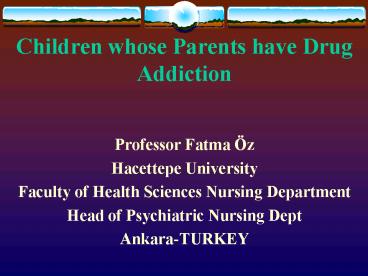Children whose Parents have Drug Addiction
1 / 31
Title:
Children whose Parents have Drug Addiction
Description:
Getting sick of the one of the family members effect negatively other members, ... guiltiness sensations. These children are insufficient in self-confidence. ... – PowerPoint PPT presentation
Number of Views:117
Avg rating:3.0/5.0
Title: Children whose Parents have Drug Addiction
1
Children whose Parents have Drug Addiction
- Professor Fatma Öz
- Hacettepe University
- Faculty of Health Sciences Nursing Department
- Head of Psychiatric Nursing Dept
- Ankara-TURKEY
2
(No Transcript)
3
Drug addiction
- is accepted as a multifactorial family desease
in current. - Getting sick of the one of the family members
effect negatively other members, thus whole
family system is effected.
4
- Person who is drug addict is parent
- can be disruptions on the managing of family
functioning, the attending roles and
responsibilities.
5
- If this condition is chronic
- family system is effected negatively and
family process is damaged.
6
- Children and adolescents of addiction parents
comprise a vulnerable groups.
7
- Especially, children growing in this
functional environment are a group having risks
in point of view mental health.
8
- Children must cope with the direct effects of
addiction in family, - as well as dealing with the inconsistent
environment, - and their own struggle for identity at this
particular developmental stage.
9
- In addition, adolescents who grow up with
family addiction learn to discount their own
needs, so that they can fulfil the roles in the
family vacated by the adults.
10
- As a consequence of these family dynamics,
developmental tasks of adolescents are often
accelerated or delayed.
11
- Their parents addiction is the central fact of
their lives.
12
- Their thoughts, feelings, personalities and
behaviors are influenced.
13
- Many dont get the nurturing and safety that
is needed from families. - Instead they must contend with shame, fear,
anger, insecurity, denial, abandonment, and
neglect.
14
- Children are often reluctant to come forward
and discuss a parents addiction , - for fear of betraying their parent and fear of
possible rejection, abandonment, or punishment.
15
(No Transcript)
16
- They are also at risk for serious neglect and,
in some cases violence, ensest - and their lives and household routines can be
severely disrupted as a result of their
parentsaddiction.
17
- Children are at risk for conduct disorders
and delinguency, - use and abuse of substance in adolescence,
- anxiety disorders and
- impaired physical health.
18
- A child growing up in family where substance is
abused is - vulnerable to self-esteem issues,
- depression,
- stress-reated illness, and
- difficulties in school.
19
- These adolescents are also at risk for
suicide, - eating disorder and teen pregnancy.
20
In study determining on mental and fhysical
development in the children was tasted
- Children of alcoholic parents had retarded
mental development and showed behavioral problems
until 4 years of age than controls. Boys were
found to be more vulnerable than girls. The
consequences of behavior seemed to be more
pronounced when both parents were alcoholics. No
obvious deviation was found when only the father
was addicted. (Nordberg,Rydelius,Zetterström 1994
Acta Paediatr Suppl 40414-8)
21
- These children have been referred to as the
forgotten children
22
- Children cant explain anger,
- fear,
- misunderstanding,
- being hurt and
- guiltiness sensations.
23
- These children are insufficient in
self-confidence. - Children try to deal with these traumas in some
ways.
24
(No Transcript)
25
Examples
- Brave children undertaking the responsibilities
of other members - Mascots taking the responsibility of softening of
traumatic condition - Lost children not seen by someone and attracted.
26
- The psychosomatic symptoms such as
- headach,
- Sleeplessness,
- Learning disabilities,
- Depression,
- Sexual deviation,
- Antisocial behaviors can develop.
27
In study determining on perceptions of
adolescents living with parental alcoholism
- Four significant themes emerged from data. These
are - The nightmare
- The lost dream
- The dichotomies
- The awakening
- (Murray 1998 Journal of Psychiatric and Mental
Health Nursing 5,525-34)
28
These families are cured in different ways
- These are
- Rol playing,
- Drawing pictures,
- Using puppet,
- Psychodrama
- These methods are utilized for easing to explain
29
- Children are made consulting by program based
families and schools about effective
communication and coping with problems.
30
- Beeing health adult is provided and building
of health community is contributed
31
THANK YOU FOR YOUR ATTENTION






![[PDF] Psychiatric Drug Withdrawal: A Guide for Prescribers, Therapists, Patients and their Families Full PowerPoint PPT Presentation](https://s3.amazonaws.com/images.powershow.com/10087875.th0.jpg?_=20240729083)
























